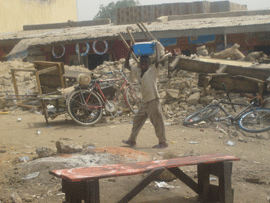
Located in the north-central part of the country, Kano state has one of the highest population densities and unemployment rates in Nigeria.
Since January 14, the Kano Urban Planning and Development Authority (KNUPDA) has forcibly demolished 3,000 of 10,000 illegal businesses earmarked for destruction in the city’s densely packed business district.
Shopkeeper Sani Abdullahi has sold household goods out of a stall in Kano city for the last eight years. He said he was given no notice before his stall was destroyed.
“More than a dozen armed policemen accompanied by officials from KNUPDA stormed my stall and pulled it down and all my wares,” said Abdullahi. “I have lost everything. I do not know where to start from.”
Relocation, but no business loans
Over the last two decades, the population of Kano city has grown by more than 60 percent to around three million people, who are concentrated on 230 sqkm of land.
Officials say that the city does not have the infrastructure to accommodate such rapid growth. The only way to deal with the problem, they say, is to redistribute economic activities and infrastructure development.
Government officials have offered to relocate shop owners to two nearby neighborhoods that have available space. But they are offering only land, no loans to help the shopkeepers rebuild their businesses.
Crime
The officials said that many of the illegal businesses were havens for criminals, and that they uncovered weapons, drugs and a body during the demolitions.
Garba Ibrahim Shela, an economist at Kano’s Bayero University, warns that the demolitions will increase crime, not reduce it. “Kano has the highest unemployment rate in Nigeria. A number of these [shopkeepers] … were repentant criminals who are now unemployed. The danger is that they are very likely to return to crime now that they have nothing to live on,” he added.
KNUPDA’s Na-Abba said that local officials recognized the dangers of the demolitions, but concluded that “it was more important to clean up Kano than to keep some small business owners employed.”
IRIN is the humanitarian news and analysis service of the United Nations Office for the Coordination of Humanitarian Affairs.




